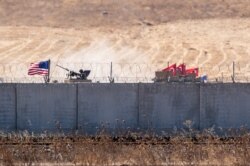Rising tensions over Syria is expected to top the agenda of talks between U.S. President Donald Trump and Turkish President Recep Tayyip Erdogan.
The meeting, expected to take place Wednesday evening on the sidelines of the United Nations General Assembly, comes as Ankara is threatening to move further into Syria to attack Kurdish militia forces. The YPG is a critical American ally and Ankara designates the group a terrorist organization linked to an insurgency inside Turkey.
Turkish forces are massing on the Syrian frontier, facing off against the YPG.
"All of our preparations have been completed along the border," Erdogan said Saturday before leaving for New York. "We have no wish to come face-to-face with the U.S. However, we cannot afford to overlook the support that the U.S. is giving to a terrorist organization."
On Sunday, Trump and Erdogan spoke by telephone on what was described as security matters. Neither side gave further details on what was discussed.
The YPG is a crucial ally in Washington's war against the Islamic State. In the face of strong opposition by Ankara, U.S. military officials last week confirmed the ongoing arming of the militia in its fight against the Islamic State.
In August, a military agreement was hammered out between American and Turkish generals to secure Turkey's border from the Kurdish militia.
Joint U.S.-Turkish military patrols have been initiated into Syria, as part of what Washington calls a "security mechanism," to address Ankara's concerns.
In what is seen as another confidence-building measure by Washington, Turkish jets Monday participated in an anti-IS operation in Syrian airspace, controlled by U.S. forces.
Erdogan threat
However, analysts say Erdogan threatens to launch a unilateral military strike against the YPG by month's end unless his demands are met.
"There are many important matters that are needed to be resolved," said international relations lecturer Soli Ozel of Kadir Has University. "But what we are hearing from the Turkish side and also from the American side is solely about Syria."
"What the Americans want and what the Turks want seem to be very different from one another," added Ozel. "This will have to be resolved; whether it will be resolved when they meet, I have no idea. If Turkey does unilaterally enter [Syria], basically erasing the [August military] agreement, then I guess we'll have another robust crisis in our hands."
S-400 missile system
Another point of bilateral tension that is expected to be on the agenda of two presidents' talks is Turkey's purchase of Russia's S-400 missile system.
Washington claims the purchase violates U.S. law under the Countering America's Adversaries Through Sanctions Act (CAATSA), which prohibits major purchases of Russian military hardware.
U.S. officials have warned that the S-400 missiles which were delivered in July threaten NATO defense systems.
Trump suspended Turkey's purchase of the U.S. F-35 fighter because of concerns the S-400 system could comprise the jets' stealth technology. Turkish companies have also been excluded from the production of the F-35.
Erdogan is lobbying Trump for the reinstatement of Turkey to the F-35 program.
Ankara sees the presidents' meeting as offering an opportunity for a reset.
"President Trump and Erdogan will be bringing new solution methodologies," said Mesut Casin, an adviser to the Turkish presidency.
In an apparent gesture to Trump earlier this month, Erdogan said he could purchase America's Patriot missile system.
U.S. visit
Earlier this month, U.S. Trade Secretary Wilbur Ross made an unprecedented 8-day visit to Turkey to discuss improving bilateral trade.
Despite bilateral tensions, Erdogan and Trump claim to have a good working relationship, chemistry Ankara will be banking on.
"Ankara has put all its eggs in Trump's basket undoubtedly. And Trump so far has delivered. Yes, there is a chemistry and so far as I said Erdogan's trust in Trump has not been betrayed," said Ozel.
"But I am sure Trump can give what Erdogan wants this time over Syria, and a free hand against the YPG," he added. "If Erdogan acts unilaterally [in Syria] then Trump, I don't think, will be able to stop Congress from imposing sanctions on Turkey."
With Turkish forces massing on Syria's border, facing off against Washington's critical Syrian ally, the stakes ahead of the Trump-Erdogan meeting are considerable.









